9 Ways to Spend a Traditional Christmas Abroad
Article and photos by Jonathon Engels
 |
| What we call the Sandcastle Santa is a moment my wife Emma and I have remembered fondly every year since — the sort of epiphany in which we realized our Christmases were not going to be like they once had been, and that wasn’t necessarily a bad thing. |
My wife Emma and I spent the day on a quiet island in the Gulf of Thailand, just off the coast of Cambodia. For the both of us, our first holiday as a couple turned out to be a most unlikely of Christmases: no need for toasty fires, no hot cups of cocoa, nary a roasted potato or pecan pie in the vicinity. We’d eaten banana pancakes — the backpacker staple of Southeast Asia — and scheduled a water taxi to an island only accessible by tiny wooden skiffs that shuttled back and forth from the mainland. Were it not for the sand-sculpted bust of Santa — which we had created on a whim — there would’ve been few clues as to the time of year. We spent most of the day supine on sarongs and snorkeling. It wasn’t traditional, but it wasn’t half-bad. Romantic even.
The meaning of Christmas is something many people have tried to capture, and depending on who you are, that meaning will invariably be different to you, your neighbor, people in other parts of the country, and most certainly those who are literally oceans away. Having witnessed all manner of celebration and remembrance, I know trying to whittle Christmas down to one set of traditions or even one religion would fail to encapsulate the holiday on a grander scale. After nearly a decade and ten Christmases abroad, I’ve seen the good, bad, and ugly sides of a holiday — if not globally celebrated, certainly globally recognized. For me, the compiling of our unexpected Christmas tales has become the tradition.
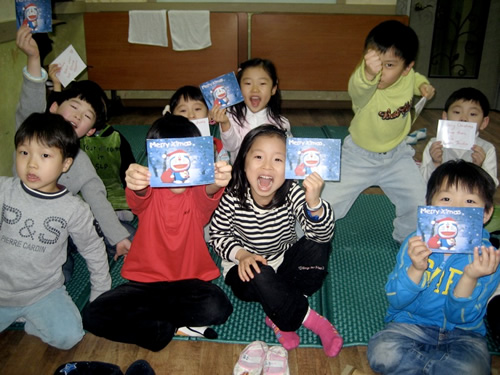 |
| One fun new tradition that came about from our holidays abroad is the element of surprise. Whom will we spend it with and where? The answer for us often includes classrooms of excited children and a glimpse into our host country’s customs. |
Coincidentally, one year before that afternoon on the beach, Emma and I had our first unofficial date in a dark cubicle-like bar with a racing car theme in South Korea. We’d joined other expat teachers and our local colleagues for an all-night, booze-fueled bash on Christmas Eve. ‘Twas the tradition, you see: New Year’s was the celebration for family, while Christmas was when revelers were meant to howl. The night included a behind-the-bar dance contest, which I won, and a bottle-juggling fire show from the muscle-bound bartender. It didn’t break up until three or four in the morning, releasing a stumbling band of carolers into the streets, and from there, Emma, a mutual friend Courtney, and I ended up sipping soju in a tent in the subway parking lot until sunrise. So began our redefining of Christmas.
Up until then, my Christmases were in Louisiana at my grandparents’ house, the same they’d lived in my entire life. They involved my five uncles and aunts and nearly 20 cousins. We ate together, including mass quantities of carved meat, casseroles, and different stuffings (rice and cornbread) drowned in gravy. We drank pop, which Emma notes we refer to as Coke, regardless of brand, from 2-liter bottles. Then, barely able to will ourselves out of the recliners, or off the couches, or from nests on the living room floor, we sampled pies, pecan (my favorite, with the nuts from a tree in the backyard) and sweet potato. There were presents, but they’d never really seemed the point. We are a family of eaters (and the early onset of heart conditions and high blood pressure).
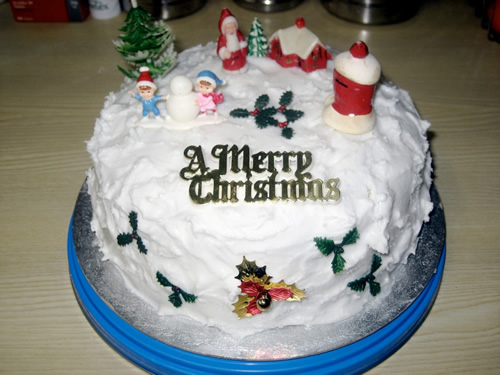 |
| The customary Christmas cake from our holiday in England. It was my first Christmas cake (my grandma always made pecan pie for me), as well as a fine example of a cake made in a homemade style, with a 1970s-era touch. |
On my fourth Christmas abroad, I was able to see what Christmas meant in England with Emma’s family. I learned about mince pies and mulled wine while watching street performers in Covent Garden in London. Christmas Eve involved walking to the village pub to visit old friends, and drinking ourselves into ample merriment. The next day, I participated in my first Christmas cracker at the dinner table and the collective return to innocence that seems to occur: Happily wearing a paper hat all day and groaning (even if you like them) over the ubiquitous Brussels sprouts at Christmas dinner. Then, for several hours, we gorged ourselves on a buffet of chocolate and nuts washed down with endless cups of spiked hot drinks. Everyone spent the day treasuring his or her gifts. On the 26th, Boxing Day, the day somehow seemed to happen again.
A few years later, we spent a Christmas in Moscow. Better put, we spent several Christmases in Moscow, all in the same winter. There were our traditions, on the 25th, which had to wait until after a normal workday. However, it was worth the wait since it snowed that evening, allowing us to experience an actual white Christmas, something that never happened in Louisiana. Then, there was Russian “Christmas,” celebrated on New Year’s with a completely different cast of characters and rituals: Grandfather Frost delivers presents at midnight on December 31st, when children are distracted. (They stay up all night! Santa would never stand for this.)
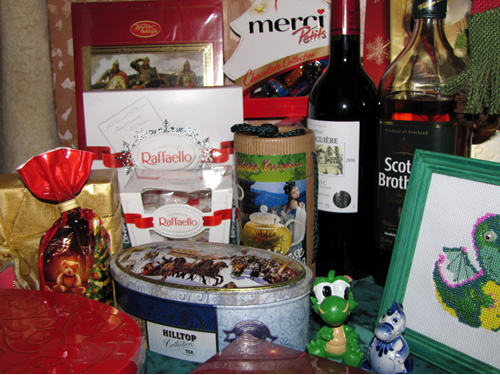 |
| The giving spirit we experienced in Russia was overwhelming. Our students gave us a ceaseless bounty of presents, with an emphasis on chocolate, but not excluding wine, whiskey, and valenki (traditional Russian felt boots). |
On New Year’s Eve, Russians enjoyed a similar indulgent feast, but there were traditional foods that told a tale of their culture — a potato salad called olivye, crackers, and cream cheese with raw garlic, salted fish, and nationally beloved Russian champagne. Without protest, we celebrated Christmas again, our experience culminating in Muscovite fashion with a trip to Red Square to watch fireworks crackling over the Kremlin. Leaving at 10 o’clock on the 31st of December, the streets and parks of our bloc were empty, but upon returning at about two a.m., there were entire families out playing, children ripping down hillsides on sleds and babushkas pounding through fresh snow. It was a picture perfect depiction out of the Saturday Evening Post, only with a post-Soviet feel.
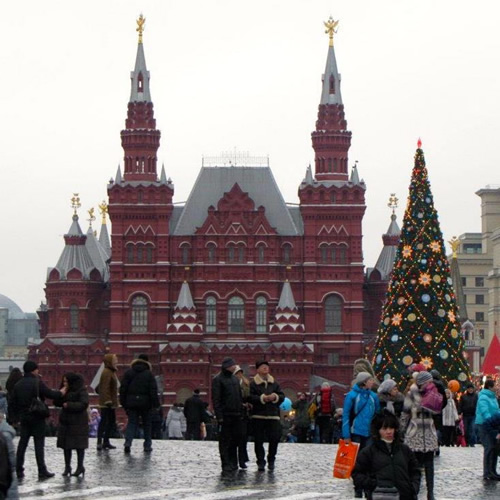 |
| Christmas in Moscow was extraordinary on many levels, but seeing the old Soviet-era architecture juxtaposed against symbols from my own childhood created an interesting mixture of thoughts that fired my imagination. |
Weirdly, the other Christmas in Russia, and our third that winter — the more official one as declared by the Russian Orthodox Church — slid by quietly. It seemed a mystery to most of my students and colleagues. Like other Christian Christmases, it is celebrated on the birth date of Jesus, but is based on the Julian rather than the Gregorian calendar in use by most of the world, and falls on the 7th of January. The date remains very sacred for those who practice in the Orthodox faith, but due to the Soviet years when there was an attempt to snuff out religion, much of the Russian population still views New Year’s as the special day.
However, Russia was not our first Christmas with a communist skew: On December 22, 2008, we arrived in Vietnam at about 10 o’clock at night, some 12 hours late. Exhausted from a day of rescheduled flights and uncomfortable airport chairs, we learned we’d lost the room that we’d reserved. We were sent a few blocks over to a different hostel. It was not what we’d envisioned. Holiday Hanoi was an unexpected scene. We’d not really expected much in the way of Christmas spirit. However, it’s actually big. We discovered a large promenade clad with Christmas lights stretched over the road, the centerpieces a sparkling hammer and sickle. Then, amongst the vast and varied array of market streets of downtown, we wandered onto a seasonal street of mass-produced Santa suits, twinkling lights, garlands, and glitter.
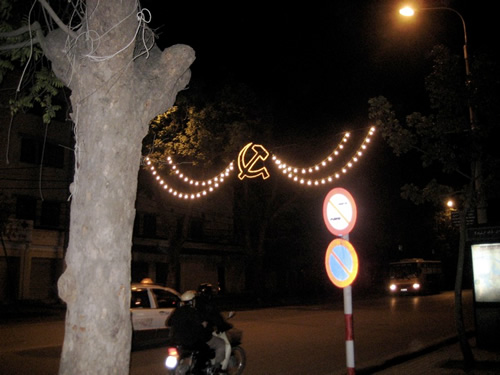 |
| Both the power and the commerce of Christmas have made their way around the globe. The discovery of a very minimalist but presumably a State display in Hanoi, Vietnam, provided both a welcome surprise and curious amusement. |
The next night our original hostel took us back. It wasn’t until about a quarter to midnight that we’d officially put our bags down for the second time, grabbed a couple of beers to sip at the bedside, and were thrilled to find Home Alone 2, Emma’s favorite film, on the hotel TV. At midnight, there was a knock on the door, and the receptionist presented us with a piece of cake in a plastic take-out box. “For Christmas.” What a lovely surprise. The next morning, we departed for Halong Bay, where the Viet Cong hid during the war, and spent Christmas Eve aboard a boat with a strangely warm, family atmosphere, playing cards with some fellow passengers’ children.
Oddly, in the most notable of Christmas locales, Bethlehem, our celebration largely gave way to a mix of rushed religious ceremonies and Arabic pop performances. We stayed in an unusual hostel — Ibdaa Cultural Center — in a Palestinian Refugee Camp. Walking into Bethlehem proper, we passed the massive Security Wall between the West Bank and Israel. Lunch was falafel. After visiting the supposed actual, precise birthplace of Jesus, we wandered through the market streets around Manger Square. That night, waiting for the midnight processions — each of which were rushed to accommodate the vying of each denomination — we watched hours of Arabic pop performances on a temporary stage erected in the square. It was done in good faith, so to speak, a real effort to respect the occasion, but seemed to miss the mark.
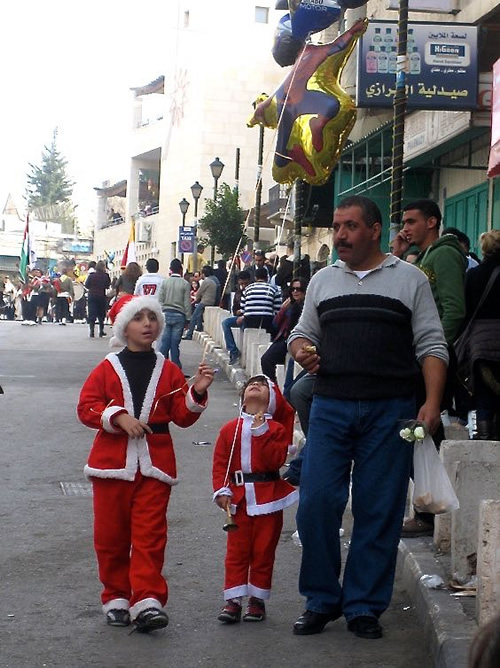 |
| The little town of Bethlehem, just inside the West Bank, is packed with tourists each year, and residents have undoubtedly joined in the festivities, helping to fill Manger Square with life, love, and family each Christmas Eve. |
In Guatemala, despite summer-like temperatures, Christmas is huge, and it was a different experience altogether. We were teaching at a small school in a rural village, a place where weekends were overwhelmed by dueling Episcopal and Catholic radios. When our students, of largely indigenous origins, drew pictures of Christmas, they included the three volcanoes visible from the village, a bright sun over glossy green mountains, and a snowman. Others sketched pictures of the nativity scene. At midnight on Christmas Eve, some 6,000 feet high, we looked over the valley below lit up with fireworks while cheers and blasts echoed from all the surrounding villages. In other words, Christmas shared familiar sentiments but with the love of firecrackers as part of the festivities.
Unfortunately, the holiday season is also one of the worst times for crime. On a bright and shining warm Christmas Day, we went out on nearby mountain trails for an ill-advised hike. En route home, we were held up at gunpoint by two masked men. After several drinks to shake off the fright, and a few tears shed, we finished the day with a delicious Christmas dinner with all the trimmings, sharing the season in a guesthouse with a temporary family of like-minded travelers. We now see the stick-up as more a beloved story of holiday perseverance than something to be regretted. We do not condone the behavior, but we like to think the bounty of those bandits might have made someone’s Christmas possible. We enjoyed our time there so much we returned to spend another Christmas in the same village.
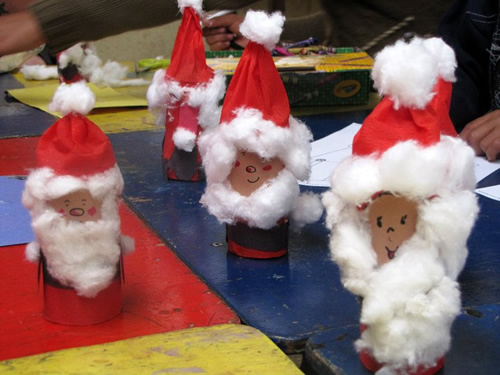 |
| Summer break for schools in Guatemala takes place in December, so while volunteering at the NGO — Las Manos de Christine — we helped to host a summer school program, which included thematic crafts, sports, and other fun activities. We collectively had a blast. |
A recent Christmas, also in Central America, allowed us to spend some time with Costa Rican family on their farm, where we were volunteering. Our celebration centered on making the customary Christmas tamales, a process that included going out to collect the banana leaves in which to cook them. The funny part was watching the faces of locals as we invented what may have been the first ever vegan tamales. (Usually, masa or corn dough has lard in the mixture — we substituted coconut oil — and is filled with meat, which we substituted with vegetables.) Again, though we’d distorted the traditional recipe the family was excited to see us taking part. The entire event involved all of us stuffing ourselves, sharing our time and traditions. We ate our version of tamales for the next three days.
Truly, if nearly a decade of Christmases abroad has taught me anything, it’s that people on the whole, on a global level, love the opportunity to share in something, anything. They love to prepare and commune around food, to exchange well wishes, to share beliefs and stories and traditions. It doesn’t matter why we get together for such events so much as that we do, and Christmas is as good of a reason as any. So is Ramadan, and Vesak (Buddha’s birthday). So are all such sacred or communal events. I have learned that the fundamental spirit of Christmas — peace on earth and good will towards other humans — somehow translates and migrates wherever I have visited. The spirit is already there.
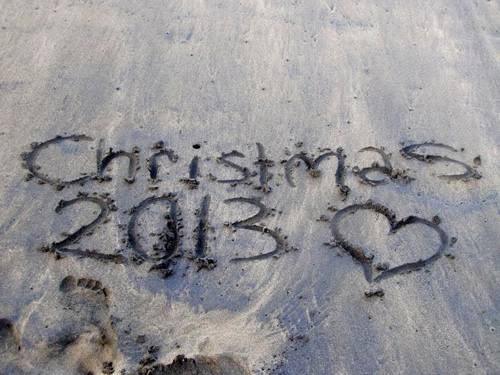 |
| In 2013, we spent Christmas in Costa Rica and visited the beach near Puerto Viejo, along the Caribbean coast. It was our first sand and surf Christmas since Cambodia, and hopefully the second of many to come. |
 |
Jonathon
Engels earned an MFA in creative writing.
He has lived, worked and/or volunteered in seven
different countries, traveling his way through
nearly 40 countries between them. His many interests include permaculture, veganism, and ways to live sustainably.
|
|
